#to both noé and vanitas from vnc
Explore tagged Tumblr posts
Text
vanitas episode seven “love” and that iconic tamaki line that i’ve rephrased (bc that is seemingly my only talent)
vanitas: “i’ve never danced with a vampire before”
noé: “yeah well i’ve never danced with an idiot before so,, i guess we’re even”
if you want to read a very fluffy (and very gay) rewrite of this episode check out “why don’t you dance?” on ao3 by wonderfilled18
#THEY DESERVE FLUFF SO HELP ME GOD IM GIVING IT TO THEM#vanitas no carte#memoir of vanitas#vnc noe#vnc fanfic#vanitas the traumatized#oh my god bro i love this show#canon rewrite#fanfic#noé my beloved#they’re both gay and bad at feelings#hehe i love them#vanitas fluff#they deserve to be together#i quoted this and shocker i do know where it’s from#ohshc anime#look guys i made a link (you should click it cuz it’s cool)#hello little gay people in my phone#the case study of vanitas
14 notes
·
View notes
Text
Also I'm gonna say it y'all can argue with the wall
VNC is the ONS of the younger generation
#obviously not in a negative way since I LITERALLY LIKE BOTH#and I've seen other ONS fans also like VNC and viceversa blahblah#and various similarities#fun fact actually first ever witness of VNC was a friend of mine posting an edit of the scene where Noé sucks Domi's blood from her hand#and me not knowing who these two were just went 'bruh that's so obviously inspired by ons come on'#it's an unwritten rule in my head. if you like one of them; you also like the other#and also I say 'younger generation' cus vnc is way more recent than ons and I was 14 when ons first aired#so I'd assume most of the vnc fanbase is also that age? but i could be wrong obviously#vanitas no carte#owari no seraph#forgive me for any possible typos in the tags i don't want to rewrite all of them#moon likes to rambletm
3 notes
·
View notes
Text
The lost name
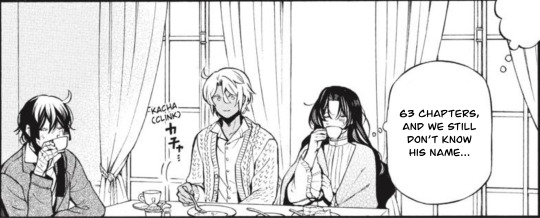
I think Vanitas’s real name could be Deucalion.
In this text I’ll cover my reasons for choosing this name, its connection to the story of Noah and the myth of Pandora and how would it correlate with the relationship of Vanitas and Noé.
Posting this as an actual answer to @scar-eyejolteon14 as promised here.
The lore of Deucalion
It all started when I was wondering what kind of name I could give Vani if I were to draw him as a Chasseur (ordinary human, who’ve never met Luna and never inherited their name). I began with the most obvious thing: checking Vani’s wiki page for existing details and references. I went with his zodiak sign, Aquarius, as the staring point, because stars and celestial bodies are recurring theme in VnC and well why not?..
The next obvious place to go is wiki page for Aquarius. Here we come across a fun thing: Babylonian star catalogues. They contained lists of stars, constellations, and planets.
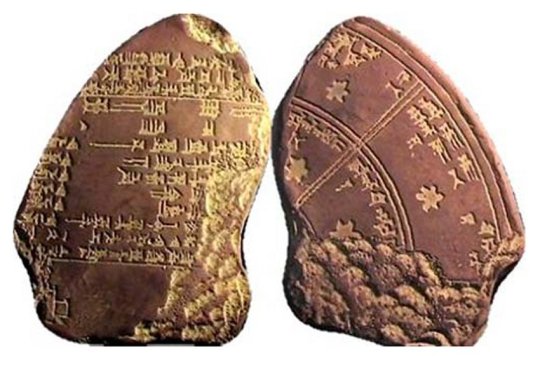

I found the first picture on a somewhat strange website, but whatever. This is a fragment of a circular star calendar, which belonged to the library of King Ashurbanipal (668-627 BC) in Nineveh. The second picture is a star list, found in Uruk (320-150 BC). It had information on all constellations such as names, number of stars, their distance, etc. Just so we understand that astronomy was a big deal there.
And yes, the capital of Babylonia was Babel — that one city with the tower (The Book of Genesis, Genesis 11) which is referenced in VnC.

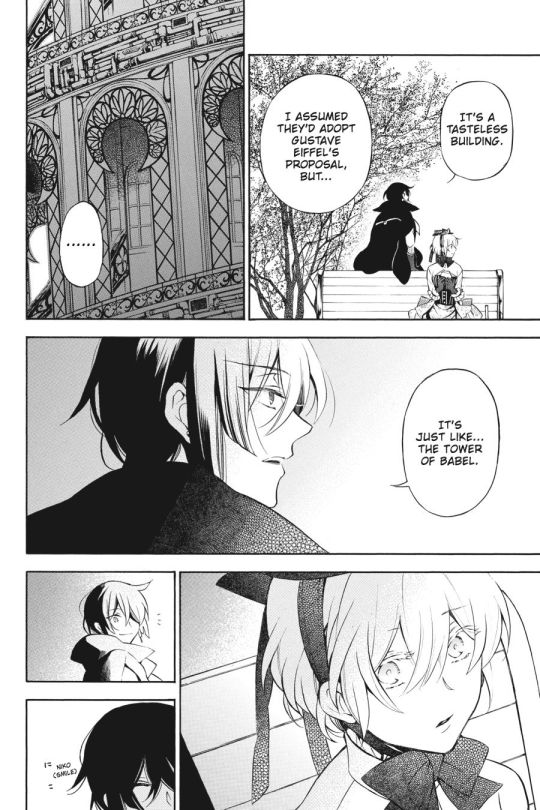
(Ch. 21)
What did Babylonian astronomers think of Aquarius? Well, they associated this constellation with the Ea. “The Great One” is his title. He’s also known as Enki, god of magic, fertility, creation, etc., who was originally a water god (and his temple name E-apsu means “house of the watery deep", idk I think it sounds really cool). The water theme is not random: Aquarius was also associated with floods. Water was sacred, but also deadly: floods were source of destruction.

Later, a Latin author Gaius Julius Hyginus quoted an Alexandrian historian Hegesianax that Deucalion is to be identified with Aquarius, "because during his reign such quantities of water poured from the sky that the great Flood resulted." Again, we see the idea of destructive flood. But where does Deucalion bring us? To Noah. Or Noé, if you will.

(Ch. 1)
Deucalion and Noah
Both Deucalion and Noah are central figures of the classical flood myth, which exists in various cultures. While these two are probably among the most popular figures, there are other examples, including Utnapishtim, who was warned by the god Ea (who also created humans among other things) about the flood and instructs him to build a boat and save his family and animals. The stories of Deucalion and Noah follow the same pattern with some minor variations. But Deucalion is the one who is associated with Aquarius, the constellation that symbolizes the coming of the flood and all its terrors, while Noah/Noé is associated with salvation of human race and all living things.

Deluge, 1864, by Aivazovsky. This painting depicts a beginning of a biblical story about the near-end of human race. It’s pretty much the same in other versions of the story.
Deucalion and Pandora
What’s interesting, Deucalion’s myth is directly related to Pandora’s myth. Deucalion is usually described as the son of Prometheus, while Deucalion’s wife Pyrrha was the daughter of Pandora. And Pandora’s myth is among the core themes of “Pandora hearts”. If we consider the possibility of VnC and PH’s universes being connected, the idea of Deucalion being Vani’s true name would also make sense… For example, this theory covers the topic.
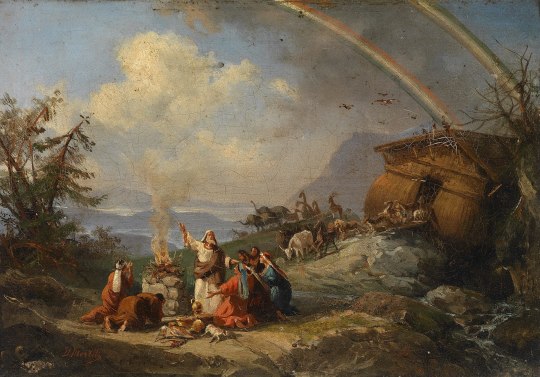

Left – Noah gives Thanks for Deliverance, 1901, by Domenico Morelli. Here we see Noah from the Old Testament, with his family, as they give thanks for their safe deliverance back to land after surviving the flood. A double rainbow signifies God’s presence.
Right – Deucalion and Pyrrha, 1636–1637, by Rubens. This painting shows a scene from the story of Deucalion and Pyrrha as told by Ovid in Metamorphoses. After surviving the disaster, they had to throw stones over their shoulders, each of which became a new human being.
Even if worlds of Pandora Hearts and Vanitas no Carte don’t exist in the same universe, there clearly is thematical relation between the two stories, one being about hope and another about despair. What’s even more interesting, there was actually a whole discourse about what’s hidden in Pandora’s jar: is it true hope or is it actually an illusion of salvation which hurts even more than actual despair? The translation of the word elpis, the spirit of hope in the jar, is actually neutral in its meaning. It’s simply “hope”, not inherently “good” or “bad”, which leaves a lot of space for interpretation in media.
Vanitas and Noé
Volume 3 cover implies that Vanitas will be marked by an Archiviste. It’s unknown whether this Archiviste would ne Noé or Machina or even some other. I hope it’s gonna be Noé, because it would break a specific border between them and it will definitely be very dramatic, but Machina might do it for the sake of obtaining information, which is her main thing. Anyway, regardless of who does this, when and why, I believe that this moment is probably the real possibility for revealing the true name of Vanitas.
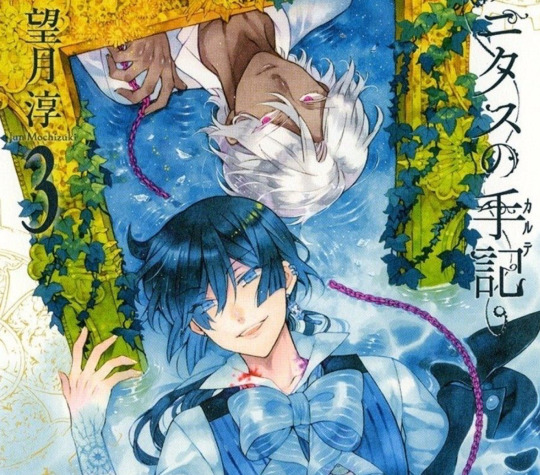
On a side note, it would also be kinda interesting if Noé gets to know Vani’s true name, but it will still be hidden from us, the readers. There’s is also a possibility that Vani’s true name will not be revealed even in this situation. His goal is to erase everything related to the Vampire of the Blue Moon, and I guess that would mean erasing everything about himself too. But in Ch1 he promises to stay here even after he is gone, so it might imply that at least someone will get to remember him — perhaps as Xxxx the human, not Vanitas, kin of the Blue Moon. Which might mean going against Luna’s request…
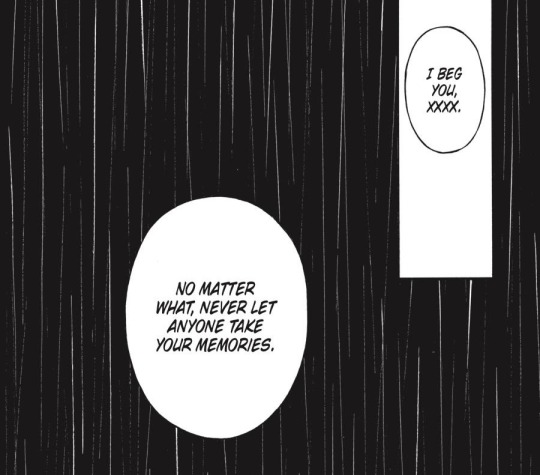
(Ch. 50)
And, well, Xxxx could de Deucalion. Just think about it: wouldn’t it be cool if both Vani and Noé were given names with similar symbolism behind it and later both assume the moniker of Vanitas?
Plus the whole “loop” thing, like “memory loop” theory and “time loop theory” (here and here) again adds to the idea of connection between them. The loop where ends and beginnings melt into each other, like Ouroboros eating its own tail. The loop between Vanitas and Noé, where they will have to understand pointlessness and hopefulness of life – and what does in mean to save and be saved.
The ultimate hope of survival becomes fleeting dream for all caught in this loop. But every dream is destined to end, as pointed by Saint Germain. And what will happen, when Vanitas and Noé will have to wake up from the dream of their own? What will prevail - death and futility of life or salvation and rebirth?

(Ch. 55)
#vanitas no carte#memoir of vanitas#the case study of vanitas#vnc meta#vnc theory#vnc vanitas#vnc noé#vnc#mochizuki jun#case study of vanitas#noe archiviste#mochijunverse#vanitas no carte meta#vanitas no carte theory
70 notes
·
View notes
Text
Vnc OP 1 - Sora to Utsuro
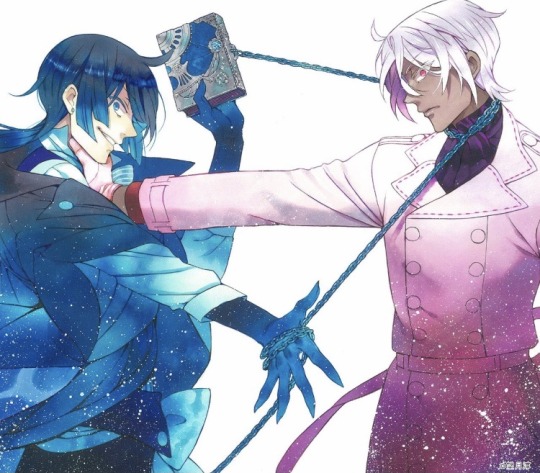
We are here again! I’ll be taking the time to talk of VnC’s first opening and breaking down the lyrics. Specifically in regards to what I will refer to as the dream loop theory. If you don’t know what I mean by that, the base summary is that the VnC universe is a story. Noé is the narrator, the character, the archiver and the creator. Noé is writing the memoires to manifest his memories. Let’s call it a memory world. He does this either to escape his regret-filled reality or to save Vanitas. However, when he “loops”, he doesn’t remember why he’s there so everything plays out the way it was written in the memoires.
Then Noé will live on, write the memoires again, and the cycle continues. And because he’s done this countless times, the memoirs gradually stray away from the original story. I’ll elaborate further when talking about OP 1. Right about now!
This was the main translation I could find for the full song (not including English covers but I could reach the same conclusions for those as well) If anyone has other translations for the whole thing, I’d love to see it. https://youtu.be/G_bJwB1YePw?si=xPVlV3_Fd57S-Bo1
youtube
/You’re pondering the simple things, pretty much human emotions and love/
/I hope one day you’ll understand/
/Too many wounds have left you patched together, a miserable sight/
/That doesn’t even know the definition of alive/
It is confirmed that this opening is from Noe’s POV. But keep in mind for the rest of this thread, it’s future Noé speaking. There are two main readings for the song; for the most part it’s Noé talking to or about Vanitas. And then there’s Noé talking to himself. This part has both interpretations.
Noé to Vanitas: Vanitas does struggle to understand his emotions throughout the story, that includes love. Vanitas is a broken individual, has too many wounds/trauma Noé cannot ignore and for a long time, was fueled by getting his “revenge”. Thus he’s forgotten what it means to live. You can also read into “doesn’t know the definition of alive” in a meta sense, from the beginning of the story he’s already dead.
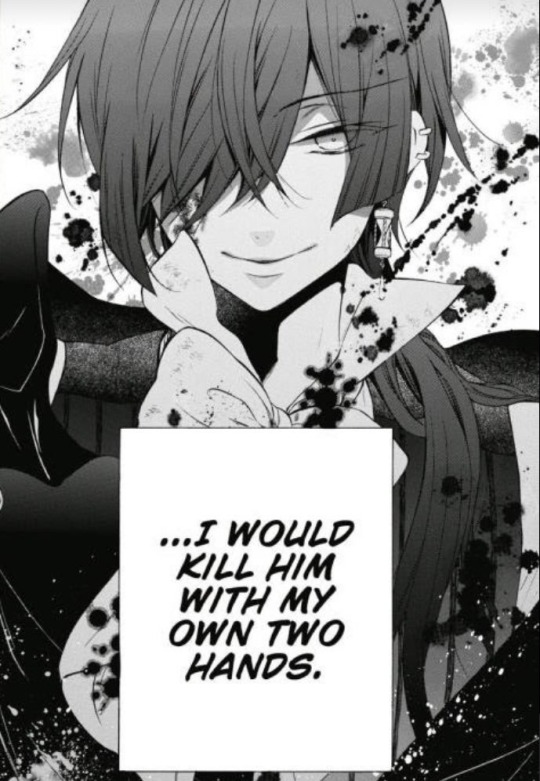
And the very name ‘Vanitas’ is surrounded with the imagery of death, futility and mortality. So yes, Vanitas as a concept doesn’t know what ‘alive’ is.
Noé to himself: Noé as well is trying to figure out human emotions. This is a case study of a human after all. The memoirs follow Noe’s journey in understanding Vanitas’ thinking. And we’ve had Noé blatantly ask Vanitas what love means. But we can read this as Noé , sort of telling his past self that one day he will understand and feel this pain. Take note of “many wounds have left you patched together”. As I said, he could be talking about how “fragile” Vanitas is but what if this is about himself?
/No need to say “just the two of us” or anything/
/I have a feeling we can understand each other/
/And that’s fine for now/
This is calling to the Catacombs Arc, where Vanitas repeats Noe’s line of being able to do anything together. Interesting enough, it’s that arc where we see a bit of Vanitas’ backstory and it ends with the two sitting against each other. An understanding has been reached. Of course we all know that’s what VnC is about but of course he adds the ‘for now’ because what would this show be without its looming doom.
/I love this world and the light only you give me/
/Makes the world I see through these fractured eyes/
/Look gleaming and bright/
It’s these verses that made me want to spend more time on this. First of all, ‘I love this world’, a little weird right? I can only hope this translation is the most accurate but we’re saying ‘this’ instead of ‘the world’. Makes it sound like “I like this one. I prefer this one.” And ‘the light only you give me’ is very odd if we’re saying this is from Noe’s POV. Emphasis on ONLY.
Another reason why I believe it’s future Noé singing because why would present Noé say Vanitas is the only light he has? Vanitas is the only thing keeping him from falling apart. Vanitas being the sole reason Noé loves the world…doesn’t line up with the Noé we’re seeing now. Now it could be Vanitas is a “special” light. But that kinda raises more alarms because Vanitas is very admired in this song guys. And present Noé I feel wouldn’t be so sure in proclaiming this. The world being seen through fractured eyes could be multiple things. We know Noé sustained an injury on his left eye when Teacher bought him.
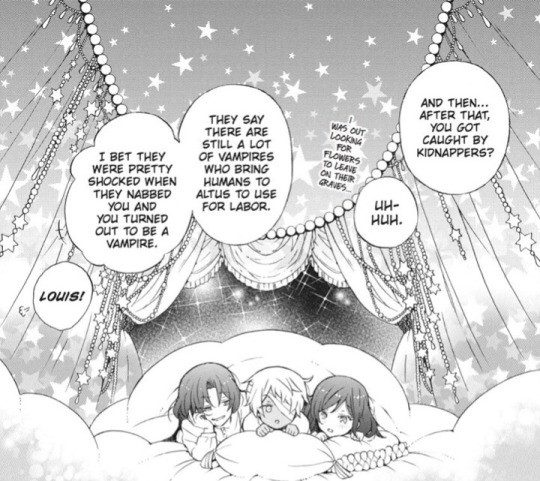
This could feed into a theory that has been speculated over the years that Noe’s vision was permanently altered and he sees things from that eye differently. Of course, it could refer to future Noe’s perception of life being broken due to the events of the series. Thus why Vanitas is the one thing that makes it gleaming and bright. You could then ask “But Vanitas is gone in the future so how is that possible?” In comes my theory. It’s interesting how Noé is often associated with light, the sun etc. but here we see him give those characteristics to Vanitas’ presence.
/There’s no such thing as a sure thing/
/But you can see me can’t you?/
Things get a little fuzzy here. Obviously, nothing is sure, nothing lasts forever. This period of happiness will pass. But “you can see me”. Assuming this world is a memory, this could be Noé being elated from seeing Vanitas. That his plan has worked. But you can also interpret this, I forgot who pointed it out but ty whoever you are, that this is the one moment Vanitas interjects in the song. Essentially saying, “you can see me, so this is not real.” As if trying to wake Noé up. And if you look at the OP itself, for most of it Vanitas is following or lagging behind Noé like a ghost. There’s even a part where Noé is looking at a drawing of a view instead a real one, Vanitas is yelling at him, trying to get his attention and Noé ignores him completely. Not to mention the OP starts and ends with Noé sleeping, Vanitas nor his belongings ever in the room almost as if it was all a dream hmmm.
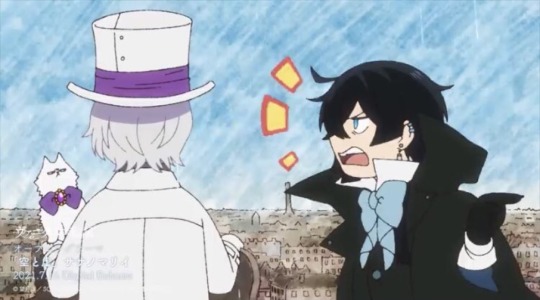
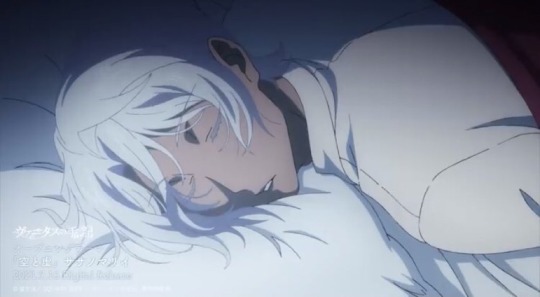
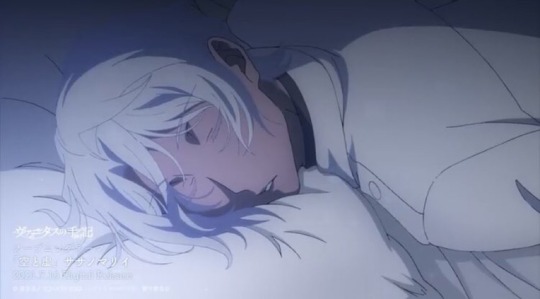
You can see this also as Noé acknowledging the world he has created is only temporary. Noé knows this isn’t real, isn’t a sure thing. But then Vanitas comes in to be like “you can see me, can’t you. So is it that bad?”
/I’m pondering the simple things, pretty much emptiness and frigidity/
/One by one lies have increased/
/Playing with a simple puppet/
/My rusted head is shaking/
We’ve contrasted “human emotions and love” with “emptiness and frigidity” here. Frigid here means the bitter cold, stiff, lacking in warmth. The opposite of what Noé says this world gives him so safe guess, he’s talking about the reality he is escaping. Where Vanitas is dead as well as a lot of his friends. The lies have built upon each other, adding to my theory where the numerous times Noé has done this has created layers upon layers of worlds. And each one has more inaccuracies than the last. This is his story, a play, he is the writer and the puppeteer of everyone’s roles. When they appear, what they say and do is decided by what Noé writes in the memoires. But by all the loops he’s made himself a puppet too. His head being rusted could hint at many, many years passing since everything happened. What’s even more interesting is remember, Vanitas is the one usually associated with cold and emptiness. So why is Noé assigning those things to his thoughts? It really shows how future Noé has come to view Vanitas vs himself. Because ignoring any theories or whatever for a second, future Noé is clearly burdened with regrets and hate towards himself.
/Your laughing was reflected by a daydream/
/Without knowing yet we just want to laugh/
/Throw away the answer, whatever you want is fine for now/
We circle back to the dream thing again. What is a daydream? It’s something you fantasize about when you are bored or in need of a distraction. A reflection looks and behaves exactly like you, copies your movements, but is it real? We all know mirrors and reflections play a major role in the story. Whether having mirrors or frames in official art or volume covers. Characters reflecting each other like Vanitas/Astolfo, Domi/Louis, Ruthven/Noé etc. I think the “throw away the answer” is interesting, it could be Noé again knowing what the “right” thing to do is but is desperate to see Vanitas laugh. Feels very much like a “oh forget about all that, what do you wanna do?” Noé putting other people before himself and being selfless to a fault.
/I love this world that lacks everything/
/If the mechanical echoes/
/Everything seems to be laughable/
/I can’t be proud of it/
/But isn’t the burning dream beautiful/
Why would you love a hollow world? This is Noé saying this. How can a world lack everything if it’s meant to be real? Unless it isn’t. Unless it lacks what you truly desire even if you claim to love it regardless. Echoes fall into the same vein as reflections I brought up previously. ‘Mechanical’ implies it’s a machine, tying back to it being empty and hollow. Lacking realness. And it’s funny, Noé says he’s not proud of it. His world, his creation if you will. That it’s laughable even but then goes on to call it beautiful. Think about that for a minute. The dream is burning because Vanitas will always die no matter what Noé does. Everything will go up in flames, it’s only temporary but guess what? To Noé, this fleeting period of happiness is far better than whatever he has left when he wakes up.
/When the sky and the void meet look back because the dreams will come later/
/When the sky and the void meet look back be still in bloom/
/When the sky and the void meet born and die repeatedly/
/The future and lies break and laugh/
We’ll stop here because the song then goes back to the first chorus “I love this world and the light you give me” stuff. This part of the OP I would say is the most vague, you can read this a lot of ways. However you want to interpret it, there is a clear loop going on. We can see “sky and void” as metaphors for Vanitas and Noé. Personally I’d say Noé is the void because of that official art that has Vanitas with a clear sky in the background and Noé is sinking into the darkness. Similar to when he drinks someone’s blood and sees their memories.
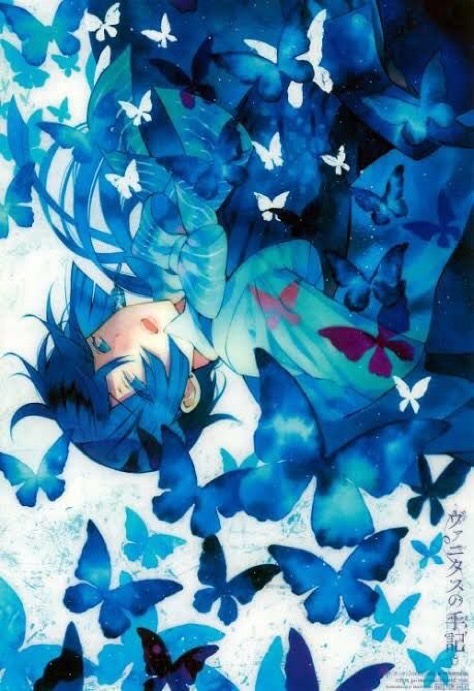
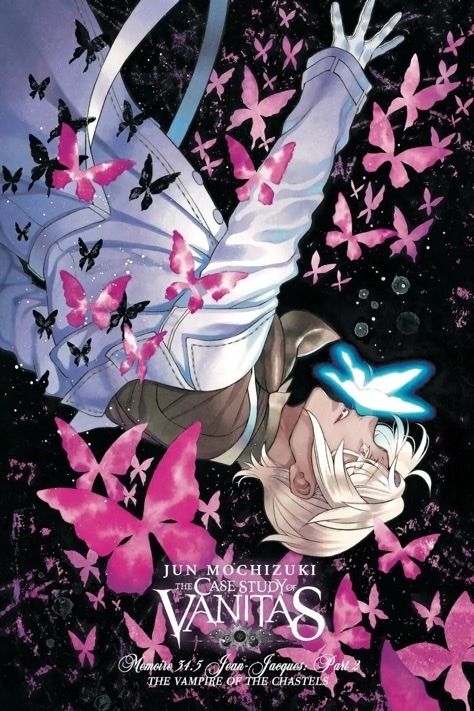
But while Vanitas has a few purple butterflies, Noé is given that distinct glowing blue butterfly. Vanitas is Noe’s light. We talk about that art for hours but that's for another day. Plus given how Noé talks in this song, it’s safe to say he sees himself as the void. And once they meet the dreams will come later, to be born and die repeatedly. Meeting could be their actual meeting from chapter one and the cycle/memory world begins from there. It could be wherever fuck they were when Noé failed to grab Vanitas’ hand. The future and lies….what lies? Who my dear readers would be lying to us :000. But eventually that mountain of lies will come tumbling down.
And, no theory just pure delulu I’ve always headcanoned that when Vanitas dies Noé is going to break out laughing. So if that happens the op spoiled it.
#the case study of vanitas#anime#les memoires de vanitas#vanitas no carte#jun mochizuki#vnc#manga#vnc manga#Vanitas#anime opening#vanoé#tumblr#noé archiviste#noe x vanitas#op#fyp#analysis#copied from twt#vanitas no shuki#threads#theories
61 notes
·
View notes
Note
Just recently found your blog and i love it!!! do have any theories for vanitas' original name? My guess is Abraham, for all it doesn't really fit him, after Abraham van hellsing, who is both a doctor and vampire expert, which I think matches mochijuns naming conventions. Doesn't hurt that it matches with Noe (noah) religiously.
Thank you!! Welcome to the party ;D
Traditionally, I've always said I don't have any strong theories on Vanitas's name—at least none that I actually expect to come true. I think(?) I've talked about this before, but that's not really the kind of theorizing I do? Since right now any name theory is wild guessing and speculation, not elaborating from the text.
That said, I do now have one pet theory that I'm partial to (one I didn't have the last time someone asked me this). I don't actually think this is going to be the case in canon, but for now, I really enjoy the concept of Vanitas's real name being Byron. This is mostly because I think it would be funny, but there are some actual connections too.
Long context short, Lord Byron wrote an unfinished draft of what would have been the first modern vampire story, and then his personal doctor (John William Polidori) took the same idea and fleshed it out into The Vampyre—the actual generally recognized first modern vampire story. But! Polidori's version of the vampire (the version that established a lot of our vampire tropes) was partly inspired by Byron himself. So Byron is sort of this almost-but-not-quite vampire author, writing but also inspiring the tropes of vampirism, which reflects interestingly on Vanitas's relationship to actual vampirism. He's not a vampire, but he's much closer to one than any other human, and in demeanor, he acts more stereotypically vampiric than Noé and many other vampire characters.
Also, Byron is the namesake of the Byronic hero, which Vanitas is a perfect example of. He's brooding, cynical, arrogant, and intelligent, but despite his gloom and self-destructiveness, he has a sort of lonely magnetism about him. Once again, the concept of the Byronic hero is inspired by/named after both Byron himself and the characters he wrote.
As I said, I don't think I'm going to be right about this, as there's a million other theories that could fit just as well, but in the meantime, the concept does tickle me. Polidori's Byron-based vampire even has an especially strong connection to the moon :D.
Anyway, I really like your theory as well. I've noted before that it's interesting that there's no Van Hellsing reference in VnC (or any direct Dracula references at all, save poor dead Mina). It's almost surprising given Dracula is the iconic vampire story. I never even considered that there could be a Dracula reference hidden right there in Vani and waiting to be discovered, but it does make sense. The doctor/vampire expert connection is really fun and fitting! Though I'm afraid I don't know enough about the biblical Abraham to say anything interesting about that aspect beyond what you pointed out there.
#look mom I finally have my very own Vanitas name theory! I'm finally a real theorist!#(lmao)#thanks for the ask!#ask#anon#vnc#vanitas no carte#the case study of vanitas#theory#comparison#vanitas my beloved
44 notes
·
View notes
Text
Knowledge in VNC : About Noé's eyes
So, we all remember that when Noé was very, very young he was injuried in one of his eye right ?
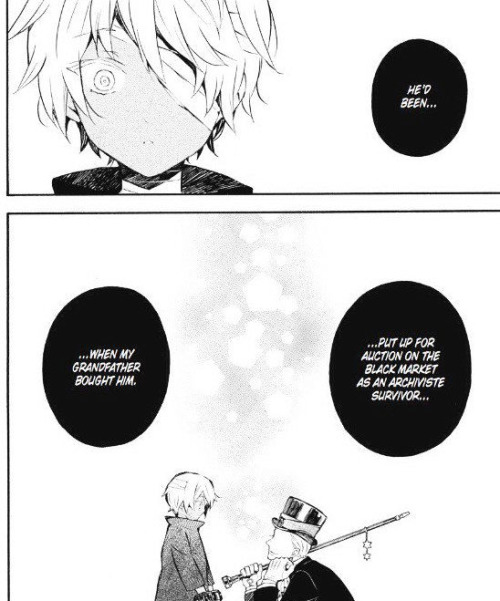
While people wonder why his left eye specifically, I might have the answer to this.
In latin, left is said "sinister" but in french it gave the word "sinistre" which means omnious and therefore lead to countless surpestition of left briging you infortune, on why you should never eat with your left hand, or that the wrong decision is always to choose the thing in the left etc. This comes from the Greek since Roman saw the left/sinister as a sign of good fortune and since VNC is full of latin/french reference it might be why.
Anyway, that answered. I'd like to point out something. In the Opening 1 of VNC, 空と虚/The sky and the void, towards the end of the 1st chorus, those lines are mentionned :
その目に僕は見えるでしょう?But those eyes can see me, can’t they?
You migh wonder why there would be such a focus on vision. Well, for a long, long time vision is associated with knowdlege which is why the word "blind" can have the literal meaning of not seeing things and the figurative meaning of not seeing them in the sense that you are ignorant about it despite the answer being right under your nose.
So to explain this I'd like to use two mythological reference : Oedipus and Tiresias.
Oedipus is know very infamous for giving it's name to something Freud called Oedipus complex, but in Sophocleus's tragedy, Oedipus king, there is an interesting play between the vision and the knowledge thanks to the use of the verb σκοπέω/skopeo which both means to see/to observes and to judge/to think. Hence the play shows us an Oedipus that has the answer to the question he has at the begining reguarding Laios's murderer and the fact that his wife Jocaste is actually his biological mother, but he doesn't see it, he is figuratively blind which causes him to not see in the sense of him making terrible decision and when he finally begin to see the truth, he is crushed by reality which causes him to blind himself literaly, saying that he is now as blind as he used to be at the beginging of the play. I could go on with this due to how interesting this auto mutilation act is, however I am supposed to focus on VNC.
Following this logic, I think that Noé's "bad eyesight" is mainly symbolic to how he is blind to some things of the world. At the begining of the story, he is mainly a child at heart, an innocent and well intentioned young man. He is pretty much a white page, he doesn't know the reality of so many thing and concept such as love or salvation. His vision is cracked to shows how much of an unreliable narrator he can be. We already had many instance of Noé's vision on an event being portrayed differently. See when he met Vani for the first time :


VS in chapter 52


We may wonder why it changed right ? well, it's because Noé vision/perception of things is shaped by what he knows of it.
An example of this in the Ball masqué arc
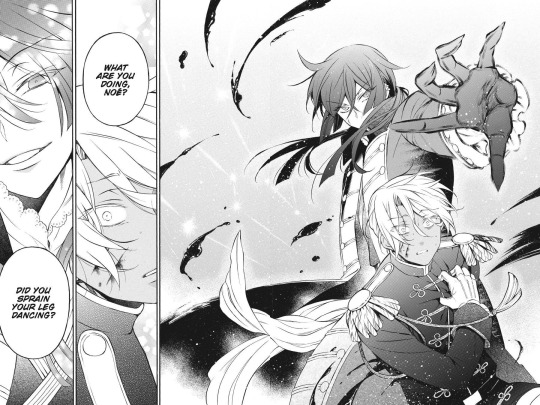
That's how Noé sees Vanitas. He is portrayed as radiant here, and the reason isn't just because he saved him from Naenia, but because Noé saw Vanitas saving several vampires using the Reverse operation, which gives him hope.
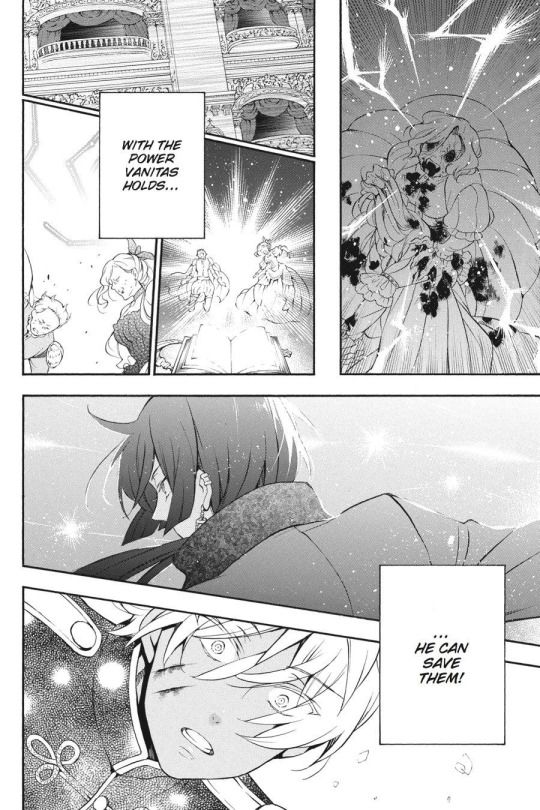
Vanitas is seen as a saving figure because it restored Noé's hope. After all, he experienced the loss of his childhood friend due to Curse bearer degeneration and this happen right after Naenia made him remember that.
However, when Vanitas fails to save Catherine and kills her instead, the portrayal/way Noé's view him changes
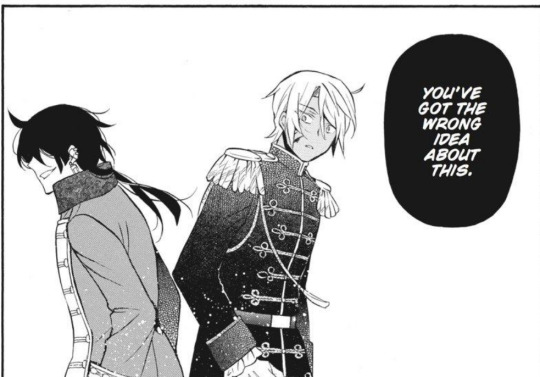
Vanitas's dialogue is in a dark bubble leading to understand the dialogue has a dark connotation which worries Noé creating a transition
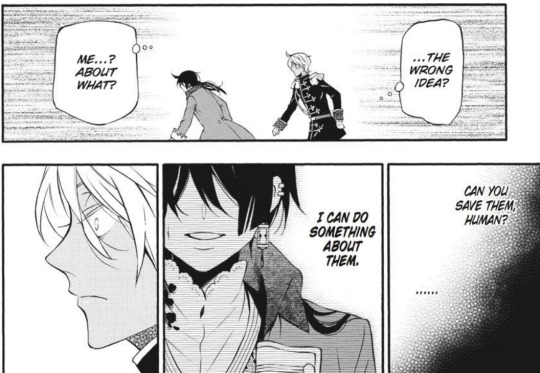
The panel where darkness seems to be growing and thus contrast with the light panel where Vani's hair shines brighter with the use of trame; replaced now by ink to signify darnkess as taken over, and here it's in Noé's vision.
When we are at the point where he will kill Catherine, Noé becomes more hesistant, the look on the panel showing his anxiety and then

He remembered the face Vani made when he claimed to save all the Vampires but with the dialogue he said a bit earlier, and while many commented on how threatning this face is, the fact that Noé remember this face right as Vanitas is about to kill Catherine says a lot on how he ended up viewing him very differently from the moment Vanitas saved him.
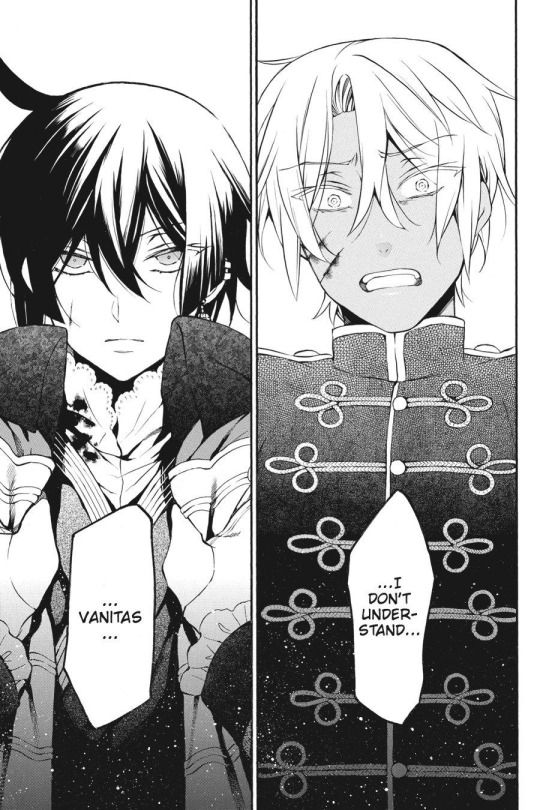

With this example, you can see that Noé's perception is limited to what he knows of the thing he see, modeling how he sees things.
By the time of chapter 52, Vanitas could have once again appears in his soft side, having saved Chloé and having Noé learn about his own insecurities. But in this chapter, Vanitas threaten to kill his childhood, friend, hence he doesn't view him anymore as the same and is unable to focus on him. An blatant example is how he failed to notice that Vanitas made this face when he tried to attack him.
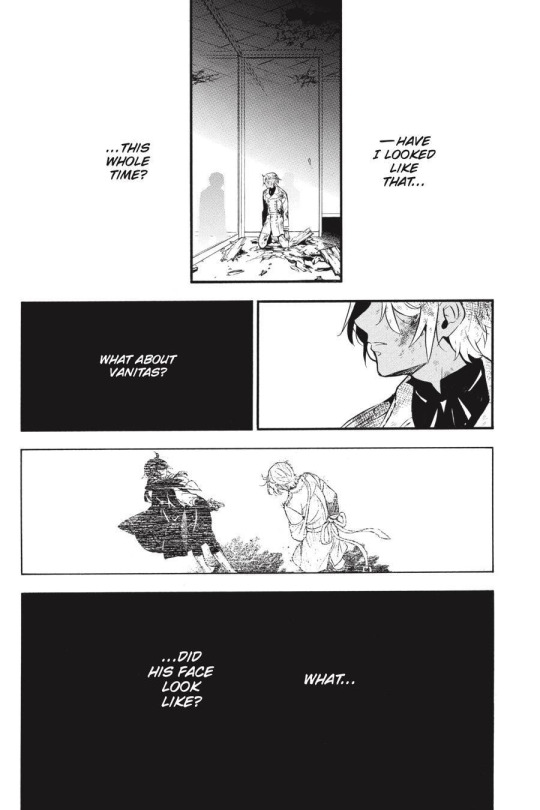
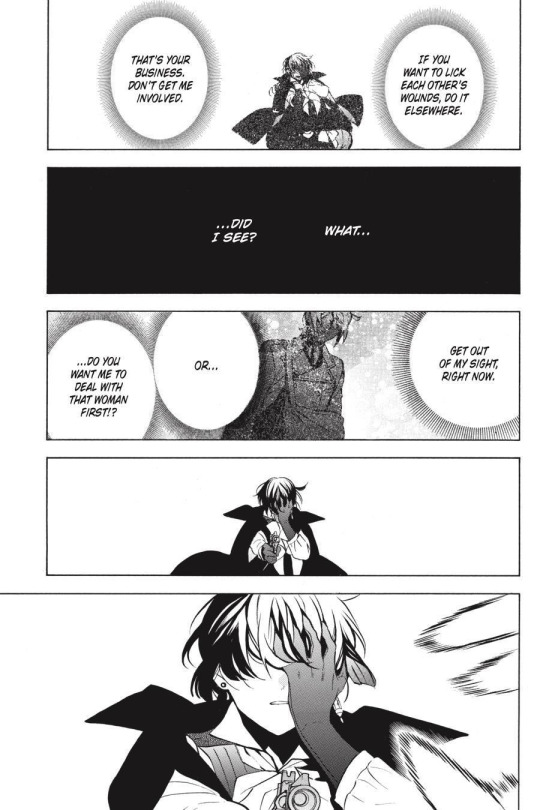
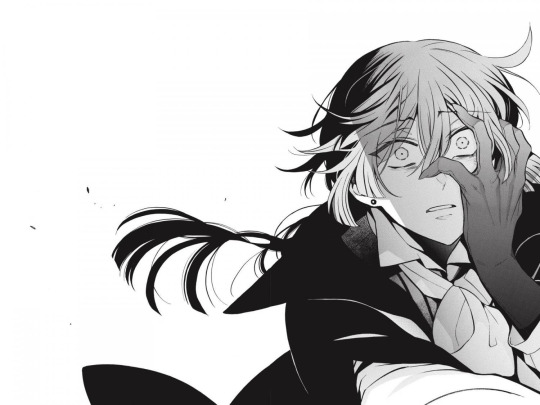
He will admits it himself, but it isn't before Jeanne, an objective watcher call hims out

That he snaps out. And even then he doesn't understand
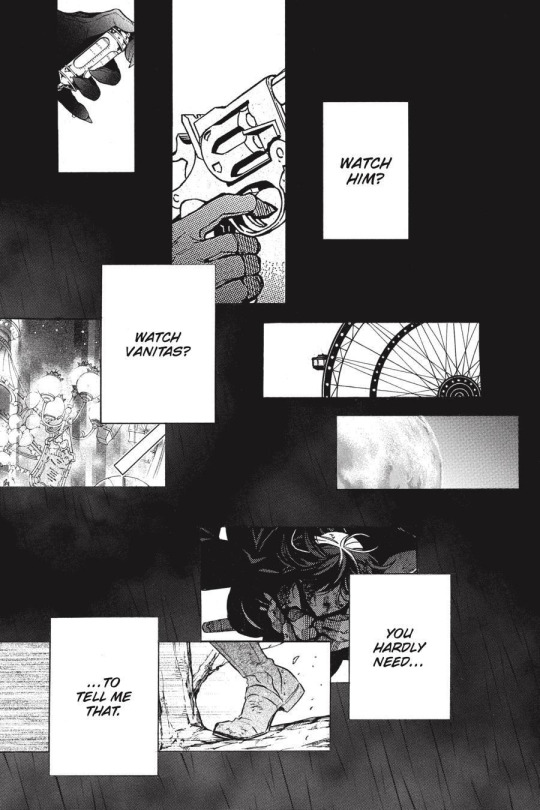
Until he sees himself in the mirror

The fact that Noé's vision of Vanitas is shaped by what Vanitas let him see of him, coupled by his blind self makes him an unreliable narrator, especially when it comes to what VNC is about : knowing who Vanitas is.
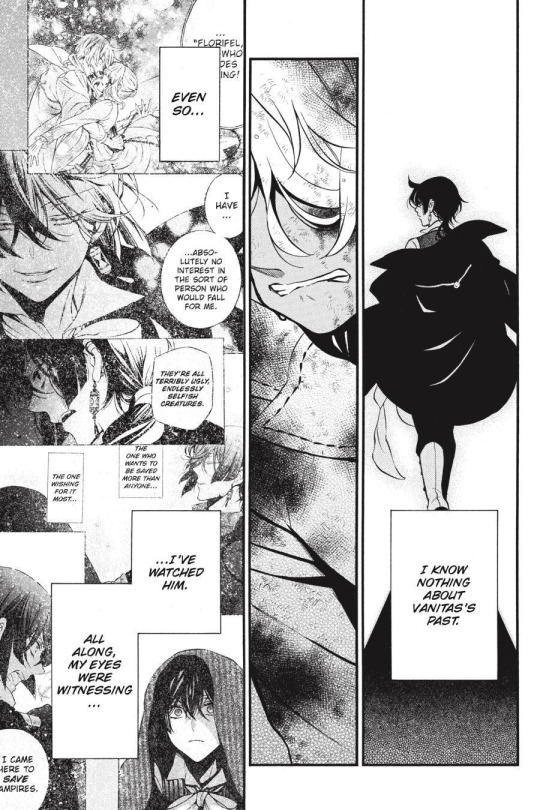
Hence, I think Noé's eyesight is actually refering to this element, that he is figuratively blind. At least for now.
But it should also be noted that Noé and Vanitas don't view the same thing in the same way as they have different knowledge of it and I think nothing illustrates it better then their duet song, Le Formidable where the chorus goes as such :
I walk into this
useless (Vanitas)
wonderous (Noé)
world
The chorus and some of the verse are constantly showing the dichotomy of how these two sees the world, contrasting between Noé optimism view and Vanitas's pessimistiv view, and the two untertwining creates a sense of discontinuity within the lyrics as the song keeps switching between their 2 POV which is complete polar opposite and this is more notable when the song comes to the chorus where both voices finally sings together and seems to have finally meet, but to show that while they live in the same world and lives the same adventures, they don't view things in the same way.
Now talking about Tirésias. He was a mythic poet that was cursed with blindness but the gods granted him in compensation the gift to see the future and he became a famous fortune teller. This is actually linked to an old, old belief about blindness. That although they can't see, the are gifted with a knowledge unabling them to see what is invisible to the common man. And while blind people often have sharpended sense, this is also linked to the old belief that the poet as prophetic talents.
So how does it link with Noé ?
Noé is actually an entity that is double : with have past Noé, the character and present Noé, the narrator/writer of the story. Past Noé is blind, but present Noé, while a potentially unreliable narrator is the one that knows how the story ends. After all, the end of chapter 1 sounds like a premonition.
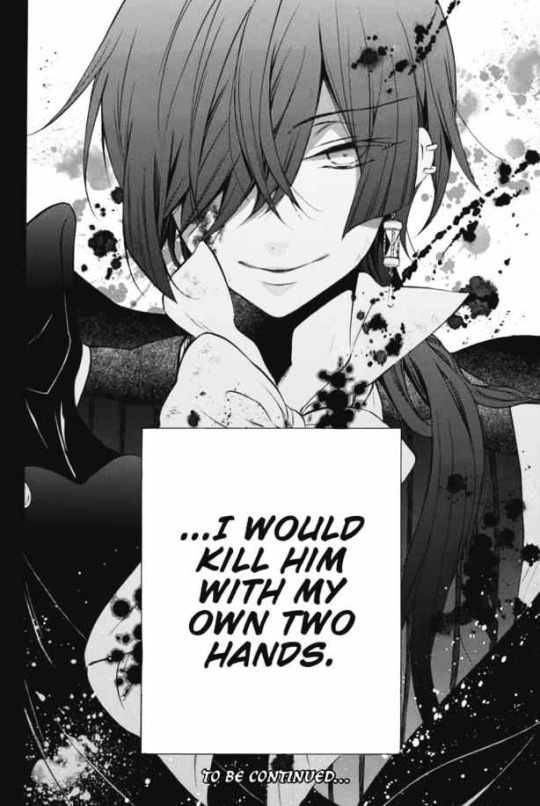
And that's because it already happen. Like for Oedipus that couldn't escape his fate, the story Noé is telling is bound to end like that because it's what the narrator already experienced. There is that critic Jean Paul Sartre made about true stories not existing arguing that the moment you tell a story when you know the ending of it, it cease be authentic because we don't know how things are supposed to end. And indeed, no one but God can know what will happen in the future. It is what is name the occult, ot "what is hidden"... what people used to believe blind people could see as compensation for their defective eyesight.
That add up to the fact Noé was shown to be literaly defective within his eyesight due to his injury. But canonically Noé has the power to know something that others vampire in particular can't. As an Archiviste, he can knows the past of someone by drinking their blood and looking into their memories, which got him to have a lot of people looking down on him for that has it's allowing him to look on what is intimate, etymologitically, what is deep inside of them, that which they occult. And in the case of Vanitas in particular, it's something that 1/ Vanitas don't want him to know 2/Noé admits in chapter 52 to not know.
However, as I mentionned the narrator knows the ending of the story, which contrast with how Noé is ignorant of the events of VNC compared to his future self narrating the story. And in chapter 56, there is finally a hint of him learning his irremediable fate
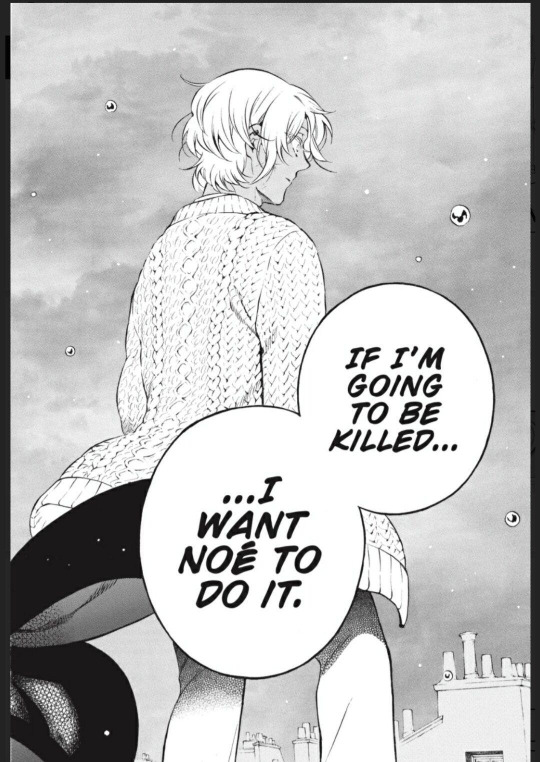
From the mouth of Vanitas, Noé learns what is future self already knew and told the audience.
This might be an indicator that Noé will manage to pass of his initial blindess as he tells the story and thus recover a proper eyesight, signifying be able to see things other then through a veil of ignorance/innocence/subjectivity.
And this can be seen as through VNC, there are clear instance of Vanitas moments focused when Noé was simply not here, and thus should not know about it, specially when Vanitas nevers tell him about it, such as his meeting with Jeanne at the ball, his discussion with her during the lunch Lucas invited them to partake, their meeting at the ball, their date in Paris or in the cabine.
There is also the fact that he relates his meeting with Ruthven in the meantime, when he should have forgotten about it. Or, the most obvious piece of evidence, the fact that he was able to convey how Vanitas felt when he attacked him even though the chapter made it clear Noé had no idea on how he looked like
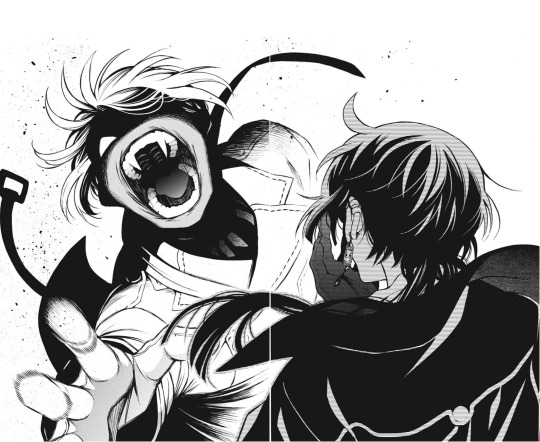
This for instance, shows that Noé/narrator was able to overcome his own biais and overcome the fact he would have remained an unreliable narrator had his vision not changed.
Long story short is that Noé/narrator knows and see what Noé/character doesn't know/see and shows us the ignorance he had at the time, while keeping in mind that Noé/character doesn't know while Noé/narrator is the one who knows everything. What is going to happen, how it is going to unfold.
Thus it is very important to remember that what Noé/character sees will constantly be challenged by what his future self saw and therefore knows.
And considering that VNC heavily deals with how Noé's vision of the world is constantly challenged throughout the story, I think it is possible that his character would evolve in such a way
#vanitas no carte#the case study of vanitas#vanitas no shuki#jun mochizuki#noé archiviste#meta analysis#manga analysis#greek mythology
107 notes
·
View notes
Text
i had a very important realization while i was out walking today. out of the main four vnc characters, noé is the one we know the least about. he fits into a category of what i would call the glass protagonist–a guy who basically exists only to narrate the story, joining the ranks of those like nick carraway and richard papen, except he's just like way more mysterious.
see, part of what makes a narrator like nick work narratively is that we know just enough about him to 1) understand his perspective on the events of the story and 2) know what his role in the story is. nick is able to give his insider/outsider view of gatsby because he is neither part of the buchanans' world nor part of gatsby's, and his role in the story is to serve as a kind of mediator between the two of them. he's daisy's cousin in long island, but he's also a working man in city, etc, etc.
the funky thing about noé is we just...don't know anything about him. we're told a couple of things about his childhood; that he was adopted by an old couple in the human world, that they died and he was somehow on sale in altus, and that the comte took him in. but really, the time before and after louis's death is uncannily empty for the guy who we're following through this world. yes, of course it's fair to say that we know the most important things about noé, but we honestly know way more of vanitas's childhood than his, and that's a big part of the central mystery of the story.
(there's an element to this, of course, that comes from both of the examples i gave before, the great gatsby and the secret history, being novels. as readers, we get an extra level of introspection from nick and richard that is very difficult to translate directly into manga as a medium. however, i would argue that it's not impossible, and all that being said it does sometimes feel intentional on mochijun's part just how little of noé's background she's shown us.)
both nick and richard narrate their respective stories onto the reader from their position as outsiders, which we know is noé's role in vnc from the get-go. i mean, he says this explicitly in chapter one: "this is the tale of how i met vanitas, and how we walked together, of all we gained and lost, and of how, at the end of that journey, i would kill him with my own two hands". he's the narrator and this is his story, just like nick and richard, right?
but while nick and richard are the narrators, and give us, the readers, an excuse to look into their worlds, they are not exactly essential players on the board. both the great gatsby and the secret history give the impression that, without their narrators, they would have continued nearly exactly as written; the characters were doomed to fail long before the story began, and the intervention of some white guy isn't enough to either stop that. and yes, vanitas is doomed as well, but we are introduced to his death as an event that is intrinsically tied to noé himself.
"with my own two hands", noé says. he is not only an actor in the saga leading up to vanitas's demise, he is a starring player in it. (and yes, we ofc later learn that vanitas is going to die with or without noé's intervention but i think it's important to understand that this is our introduction to noé, vanitas, and the story itself) in this way, noé differentiates himself from his glass counterparts, in that he inserts himself irrevocably into the plot. he is both a character in the story and an observer, a chess piece and the one playing the game. this is why the gaps in his backstory feel so jarring, at least to me, because we are not meant to view him as solely a window into the world of vnc, but as a character all on his own.
anyways, all that being said, i'm hoping with the introduction of lady archiviste we're finally going to learn more about noé and his time with the comte, just because it's like a HUGE gap in the story.
#i think it goes without saying that domi's line about noé being a hermit for the past several years really stuck with me bc like. what.#she just dropped that line and then it was never mentioned again#noé also says in chapter one that he was sent to paris by his “former teacher”#like what does that mean. has he just not seen the comte in several years? has he been living somewhere else? what happened between them?#sometimes i think that maybe noé himself doesn't remember everything but ig we'll see#noé archiviste#vanitas#vnc#vanitas no carte#the case study of vanitas#the great gatsby#nick carraway#the secret history#richard papen#sorry if this got a little rambly by the end ahhhh
102 notes
·
View notes
Note
Hey🪿
I'm kind of still thinking about breeding kink for Noe from vnc. Although I rather think about what will happen in the future (?). Something like the fact that late at night he could wake up from a nightmare, he dreamed that he was completely alone. But when the fear goes away, he notices the sleeping figure of his wife next to him, and around the familiar walls of their house. Extra points if there is a cradle with a baby nearby or maybe a child sneaks into Noe and yn's room and asks if they can sleep together
I'm not quite sure if I'm describing this correctly. can you come up with something with this idea?

Noé sprang up in bed. Drenched in cold sweat. His lungs clawing for air like he had just come up from underwater, and out of the darkness.
He had a terrible dream. A terrible dream. It had been a while since Noé had had a nightmare, his life was so perfect now, but this one had been so real! He dreamed he was alone again. Alone again and caged. Everyone he knew and loved slowly taken away from him while he was confined, unable to get to them and stop it.
Louis
Domi
Jeanne
Vanitas
His teacher
Then finally his wife
All fading away into the darkness until he was alone and cold and locked away where no one could find him again.
The terrified hammering of his heart calmed down, the blood no longer rushing past his ears, and Noé heard the gentle breathing of his wife beside him. Though his nightmare had been vivid, apparently his reaction had not been fitful enough to wake her. Though it had woken someone else up. His ears perking up to the sound now of a baby fighting with their blankets in their crib, and the tell-tale grumbled just before tears.
Noé got up immediately and went over to his child. It seemed his daughter was incredibly empathetic, more than most newborn vampires. It was terrorized that, along with the Archiviste ability, that she would be granted specific emotion-based abilities in her Formula work. But that was just a theory.
Noé didn’t care though. She could have no powers or all the powers in the world, and he would love her the same. He picked her up and the babe immediately settled. Calm now that everything seemed alright and still very tired at this late hour.
The older Archiviste calmed down too. Realizing that his dream had just been that, and he was not alone. He had friends. A wife. A child. Noé was no longer naïve enough to believe that these things couldn’t be taken from him, but he would try his damnedest to make sure it wasn’t a reality.
“We both need to go back to sleep moi petit.” He told his daughter, who was already falling asleep in his arms as he put her back in her crib. Noé waited to make sure she was still asleep when he laid her down. Just watching her face for a moment before he went back to bed. Then, he looked at his wife, still asleep. None the wiser of his torment, and hopefully having sweet dreams of their child and the second she was carrying. Did she dream that they had a son? A second daughter?
Noé settled in and tried to get back to sleep. Reminding himself that he wasn’t alone. That this was his family. And dreams couldn’t hurt you, as they were not real and this was.
#;ask and ye shall receive (request answers)#Vanitas no carte#vanitas no shuki#the case study of vanitas#vanitas x reader#vanitas imagines#noé x reader#noé archiviste#Noé x reader#Noé imagines#vanitas scenarios#noe archiviste#noe archiviste x reader#noe archiviste smut#vanitas smut#smut#vanitas#vanitas no carte#noe archiviste scenarios#noe x reader#noe archiviste imagine#vanitas no carte scenarios#vanitas no carte imagine#vnc imagine#vnc scenarios#scenarios#imagine#imagines
17 notes
·
View notes
Text


I THOUGHT THIS PART FROM VNC CHAPTER 62 LOOKED FAMILIAR
i mean they're not. the exact same but they are very similar to each other!!
Also this could just be me but I feel like that these two have a lot of parallels. Break's family are the Rainsworths, who are not his biological family. Johann's family is Dante and Riche, who also not his biological family.
When someone they care about dies/gets threaten their first instinct is murder. When the Sinclairs died Break killed 116 people to bring them back, and when he thought Reim had been permanently dead he killed Fang. When Vanitas had threaten to kill Dante, Johann told him that he'll kill him if he meddles with his family.
Another thing they have in common is that there both, how do I put this, angry in some way/some point in their life? Break had been bitter and depress after returning from the Abyss but then learned to smile again because of Shelly. Johann... Okay, I can't say much about Johann because not much has been revealed about him yet BUT he definitely is sketchy!! With how the Dhampirs are treated it wouldn't be far off to say he would be angry at the world/society. He also has been shown to not like Noé much. Johann has also been shown to be very protective of Dante and Riche, so it's possible that he could've been similar to how Break had acted in the past, and now has something to live for and would do ANYTHING to protect it.
Another thing I'm just now realizing and probably should've brought up first but they have similar vibes/atmospheres. Though Johann is more flirtatious and Break is more... Weird. I guess. Eccentric, if you want a fancy word. They're also have this whole... How do I explain it? They're good at observing/analyzing things is I guess the best way to explain it?
I think I'm gonna stop there, there was something else I kind of wanted to talk about but I think it was a little bit of a stench fkdjgfjdf. I could be wrong about some of these, I didn't mean to write this much so basically all of it I wrote on a whim. Whatever my brain thought of I wrote down which resulted in this (which reading over it might be noticeable considering this post is kinda a mess kgjkfjgjfj). There's also the fact that some of the Johann stuff was just speculation, which could 100% be wrong. But I do think some of it I'm right about!!
#the mochijun brain left me for a month but then came straight back#love how i originally just wanted to point out that those panels looked similar and ended up writing a essay#ok a essay is a exaggeration BUT STILL#listen these two specifically have just flooded my mind recently#anytime i make a post i worry that someone else made one just like it especially since i don't constantly interact with one specific fandom#so hopefully no else has made something to similar kdfkjfjg. or at least just went into less or more detail than i did#anyways actually tags now#pandora hearts#the case study of vanitas#vanitas no carte#vnc#xerxes break#vnc johann#bro its 1:30 in the morning i need to go to sleep kdfsjfljf#purple8cat
26 notes
·
View notes
Text
noé: where are you from?
vanitas: “society would say i’m from paris…. but i say i live in the moment”
noé *even more confused now than he was before he asked*: “oh-okay?!”
#vnc noe#vnc vanitas#vanitas rly thinks he’s all that (he has a tragic origin story)#vanitas is just vibin fr#the case study of tomfoolery #i kin them both woopdeedoo#the case study of vanitas#they’re so silly goofy *implodes from laughter*#i love themmmm#i love him more than life itself#this totally happened#the adventures of the silly little gay people in the fictional media i care too much about#theyre so silly#teehee#noé just wants some answers man#but vanitas be out here doin everything in his power to dodge the most basic questions#they’re gay and bad at feelings (no one is surprised)
5 notes
·
View notes
Text
HEEEEEEY EVERYONE
I'm so sorry for my inactivity these last few weeks (months ?????)
I'll try to post more often from now on !
Also ! I come back with a new VNC fanfiction 👀
It's a Vanitas/Noé fic, who takes place in the canon universe. It will talk a lot about both of the characters' feelings.
The first chapter of the fic is avaible on ao3 and Wattpad.
MORE INFOS ⬇️
TITLE : Teach me how to love again
FANDOM : The Case Study of Vanitas
PAIRING : Vanitas/Noé
RATING : M (mature)
‹‹ Noé’s hand tightened slightly on his shoulder, offering a small but steady anchor. “You don’t have to do it all at once. Just… start by letting someone in.”
Vanitas didn’t respond right away, but something in Noé’s words resonated.
Let someone in.
It sounded so simple, but it felt.. impossible. ››
AO3 LINK : https://archiveofourown.org/works/59162620/chapters/150855949
WATTPAD LINK :
https://www.wattpad.com/story/377053728?utm_source=android&utm_medium=link&utm_content=story_info&wp_page=story_details_button&wp_uname=kaatz_fanfictions
NOTE : english isn't my first language, so please, don't be scared to tell me if I make grammatical mistakes !
#the case study of vanitas#vanitas no carte#les mémoires de vanitas#vanitas#vnc vanitas#mochijun#jun mochizuki#vnc#fanfic#fanfiction#vnc noe#noe archiviste#vanoe#vanitas x noe#noe x vanitas
7 notes
·
View notes
Text
I have to talk about Misha I’ve been holding this for so long. I am not defending him, everything he’s done is fucked up. I just want people to understand him better and idk how coherent this will be but HSVDVXHSBSJJDF
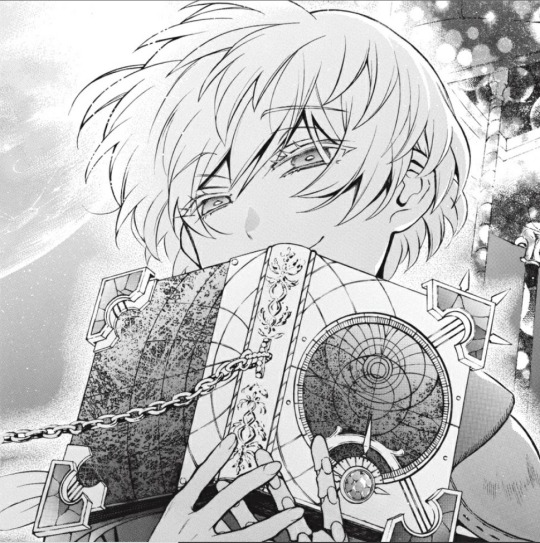
Bc if you hate him, totally justified. But I don’t want Misha to ever be simplified to the jealous crazy younger brother. Yes he is technically that but one thing about mochijun characters is that most of the time, you can always dig further into their psyche. And I feel like not enough people do that with Misha. I haven’t made an in-depth Misha discussion until now mostly bc I’m a potato. He isn’t 2-dimensional and he fits perfectly in the themes of vnc. Misha cannot be saved, he is a hopeless character, he bears Luna’s Mark while using the Book he is doomed. You can say he was doomed the second he entered the story. His brotherly love for Vanitas is twisted. He is the embodiment of tragic. Everything that led him to this point was not his fault. The only thing he chose was to follow Luna and join their clan bc he would’ve died otherwise. Luna and Vanitas are the only good things he ever had.
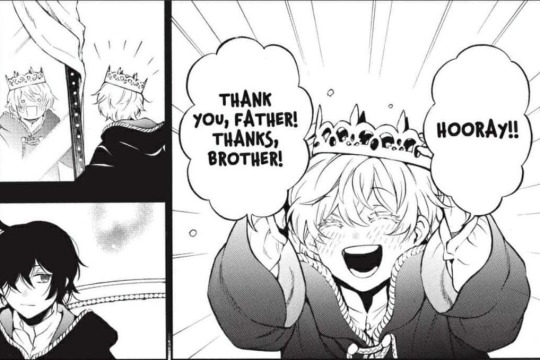
We all know his backstory. So of course losing both would make him snap. And on top of all this he’s being manipulated by Teacher. Who fucking knows the lies or orders Teacher has been feeding him. All this when he’s like 12....13 at most.
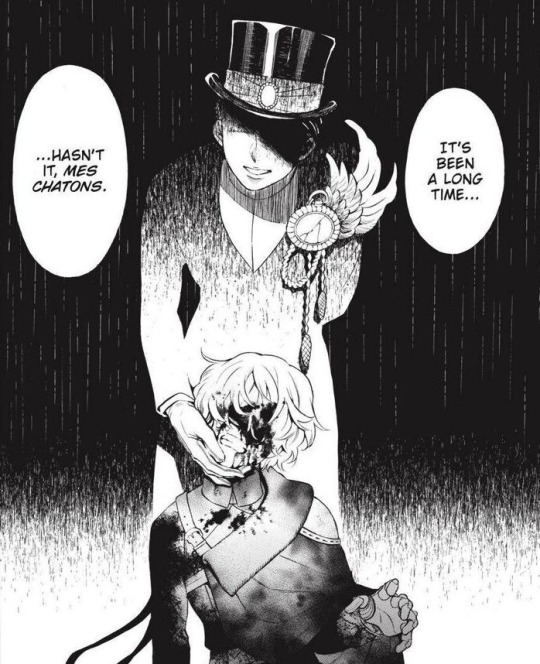
And let’s approach the vanoé situation. We know the depth of vanoé’s relationship and even though Misha might’ve observed from afar, he doesn’t have that context. To be fair he probably wouldn’t care but point is, he sees Noé as some random guy. And again, let’s withdraw ourselves a bit and see things from the outside. How much time has passed since chapter 1? How long has Vanitas and Noé actually known each other? We know that a couple weeks passed since the end of the Gevaudan arc. We know that a week passed after Vanoé got kicked outta Ruthven’s study. If there are any other mini time skips I’m forgetting pls lemme know. But let’s be honest, they’ve known each other for two months. If we wanna push it, three. Of course how long you know a person doesn’t solely decide how close you get to them. You can know someone for two weeks but depending wtf goes on in that time frame, they can become your ride or die. But let’s use Misha’s logic for a minute.
You’ve known Vanitas longer, both of you went through hell under Dr. Moreau. You have the same Mark, you’re gonna suffer the same fate. And from how you see it, he chose a man he met by chance a few months ago, over you. Someone who will never truly get it. He is putting his life in the hands of a stranger over yours. You finally meet again after all this time, and the brother who you believed puts you above everything, points a gun at you. Yeah, Misha fucked up. But that will hurt anybody.
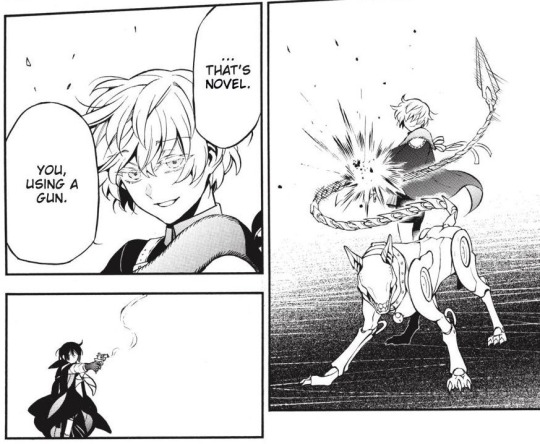
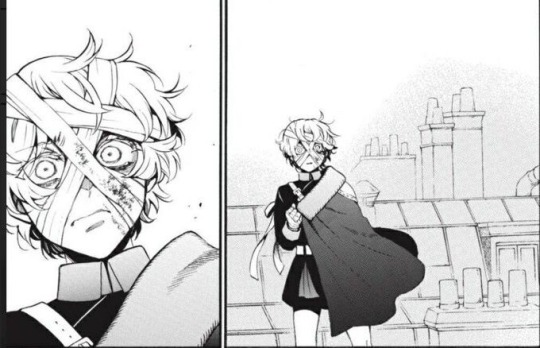
Misha challenges their relationship. He questions how much it even makes sense. It’s not only “how can you chose Noé over me?” But also “How can you kill Father but not him?” Is he more important than us?? And that’s a valid question. Messed up but understandable to ask. Noé has protected Vanitas and has been pretty helpful. But Vanitas doesn’t need him to survive. Noé isn’t essential for this suicide mission he’s on either. Misha cannot understand what Noé brings to Vanitas’ life.
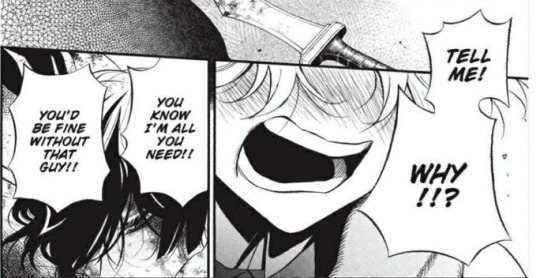
Misha was so dependent on Vanitas that he couldn’t fathom his brother not feeling the same. Vanitas loves Misha, no matter how strained or corrupted that bond has become. But he is not emotionally capable to stay with him. And he is allowed to feel that way. And Misha is allowed to scream and wail and be broken about it. In conclusion, Misha is an amazing addition to the narrative, I love him a lot. But I also love Vincent from ph so that explains quite a bit doesn’t it?
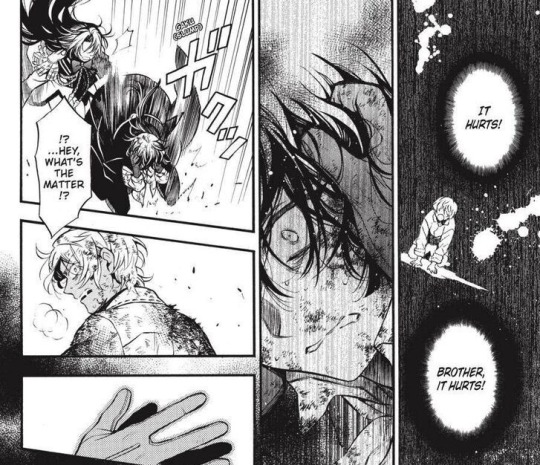
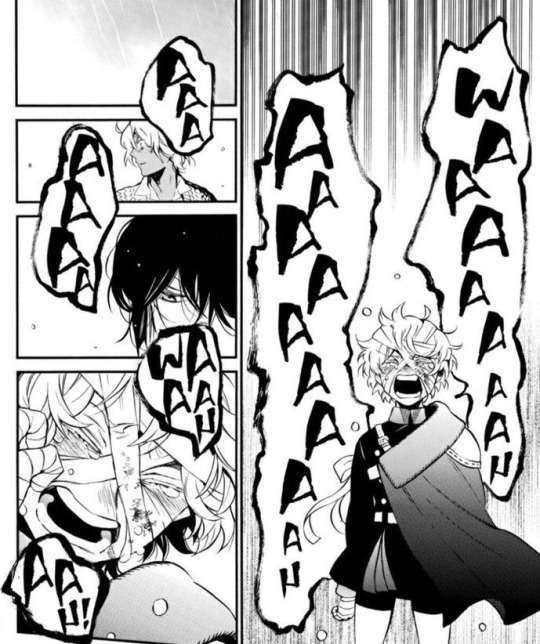
#anime#les memoires de vanitas#the case study of vanitas#manga#vanitas no carte#vnc manga#jun mochizuki#vnc#noe archiviste#vanitas#vanoé#mikhail#misha#tumblr#anime tumblr#tragedy#analysis#I feel bad for him man#hope he reconciles with Vanitas before they meet their end#hope Domi is involved too#luna vnc
148 notes
·
View notes
Text
Lord I cannot believe it took me this long to realize this, but. Vnc's refrain of Noé trying to grab Vanitas's hand is a metaphor.
This whole time I've been reading the constant references to "Noé grabs Vanitas and saves him from falling, but one day he'll fail" as very literal foreshadowing for a day when Vanitas is going to fall and get hurt (or die?) and Noé will fail to catch him. And I still think there's a good chance that's true! However, it's also really obvious symbolism for the idea of salvation in general.
I've beaten this drum to death, but Vanitas is more or less the ultimate example of a character doomed by the narrative. He is going to die; the entire story is the buildup to his death. And one of the main conflicts is that Noé wants desperately to save him (and wants it more and more as they grow closer), but by nature of the story, we know he can't.
At least by Noé's definition of salvation, Vanitas is unsaveable. His death and suffering cannot be prevented, and despite Noé's best efforts, he is going to die by Noé's hand.
Enter the falling metaphor.
The absolute certainty of Vanitas's death works like the force of gravity. He is constantly being pulled down and down toward his doom like an endless free fall. But then Noé steps in and tries to save him, and in little ways he even succeeds! In all the little less important ways, he grabs Vanitas's hand time after time.
When Vanitas goes toppling off the ledge in Gévaudan, Noé catches him and shortens his fall. When Vanitas sinks into despair in Moreau's lab, Noé snaps him out of it. And when Vanitas gets lost in his own trauma and self-hypnosis at the amusement park, Noé brings him back to reality. For all of the little free falls, both literal and metaphorical, Noé is there for Vanitas before he hits the ground. The beating heart of their relationship is Noé's constant attempts to catch him.
However, Noé is haunted by the fear that he is going to fail someday. When Faustina reverts back to Naenia and dissipates in Gévaudan, he's shown a vision of Charlatan(?) telling him his hand cannot reach Vanitas. Naenia preys on people's worst fears and weaknesses, and this is one of Noé's. He fears that his hand will not reach the one he's grasping towards, and he will fail to save those that matter to him. The very broad line "you persist in reaching out for them" in the middle of Noé trying to literally catch someone more or less tells us outright that the falling and catching is a metaphor for salvation.
And when he speaks from the future, Noé confirms that this exact fear has come true. Noé in his narration is haunted by the regrets of "that day when I didn't grab your hand." His grand attempt at Vanitas's salvation has ultimately failed, and he didn't catch him when it mattered most.
The night that he first meets Vanitas, Noé throws himself out of an airship in the attempt to catch and save him. And from that point onward, he tries to catch him over and over again. Their relationship is one long straining outstretched hand as Noé attempts to pull Vanitas from his endless plummet downward. He is the one person deeply focused on Vanitas's salvation. However, Noé cannot ultimately stop the forces of tragedy and gravity and doom, and in the way that matters most, he can never quite reach Vanitas's hand.
There is going to be a day when Noé will be unable to catch him, and that day is the day that the entire rest of their relationship (and the entire rest of the metaphor) is building to. Noé is constantly reaching out, but he cannot save a man that is already dead, no matter how passionate the outstretched hand.
#vnc is so absolutely jam packed with symbolic things#that sometimes even the really obvious stuff like this goes over my head#like how long it took me to think about Jeanne's gauntlet case being a coffin! or this whole massive metaphor!#there's just so much going on that even the most blatant things can be missed in the flood#vnc#vanitas no carte#the case study of vanitas#vanitas#noé archiviste#english major hours#the vanoé agenda#<<I've been tweaking my tagging system and trying to keep track of all my posts about their relationship. rather than just the shippy ones#but hooboy does it still feel weird to use that tag here lmao#Noé arqueueviste
312 notes
·
View notes
Text
"What is love ?"
When Noé asked about this, what was he thinking about exactly ?
Love is a feeling with different meaning according to nuances : this nuance is the object of affection which determines the nature of this love.
Love has so many different meaning that greek have at least 6 words to describe each nuance properly and distinguish them from one another :
agape : "unconditional love, charity; the love of God for person and of person for God"
eros :" love, mostly of the sexual passion"
philia : "affectionate regard, friendship"
stroge : "love, affection" and "especially of parents and children"
philautia : "self love"
xenia : "love of the stranger" or "hospital love"
and finally mania "obsessive love"
"What is love" Noé asked. This is obvious but love is going to be a big theme of VNC. Not just "love" as romance. But love in general : agape is illustrated by the chasseur for examples. Roland frenquently talks about how "God loves all", refering agape.
Noé asking what is love is another sing of his ignorance/innocence but potentially of the incapacity to distinguish between those several nuances of one same feeling, after all he can't recognize Domi's feeling about him does he ?
So he isn't simply asking what is love in the sense "what it is like to be in love with someone ?" but what it IS, this feeling with so many nuances.
We are likely to see all those nuances in VNC, but the one that Jun sensei seems to be the most focused on is philautia : see Jeanne's arc, see Domi's arc, see Chloé's arc, see Vanitas.
This is not only about the character loving someone, but also them learning to love themselves.
Now in japanese, there are also different way to talk about loves : suki, daisuki, aishiteru, koishiteru etc.
While suki and daisuki can be both used for platonic and romantic relationship (arguably aisheteru) koishiteru seems to be stricly about romantic feelings (tho I'd still need to check)
so when a characters says they love/like someone, in which sense do they mean it ? Do they even know the nuance ?
"What is love, what is it to love someone ? How do you love someone ? How do you do to be loved by someone" ?" etc.
With all the nuances of love, Noé's single question covers more nuances then it appears
Noé also asked "what is salvation ?"
Is love salvation ? And if it is, what kind of love ? philia ? eros ? or philautia ?
22 notes
·
View notes
Text
vanitas from vnc is Roma-coded. rather, his family background indicates he, his father, and their caravan were stateless and nomadic. further, given the prevalence of Roma stereotypes in 19th century French literature, some of which compared Roma characters to vampires or vampire-like creatures, the then-role of the Church in defining French identity, and Vanitas's otherness from both vampires and humans, i don't think the coding is incidental.
i.e., while I'm also excited by the most recent chapter, I'm still thinking about how Vanitas explained systems of oppression and prejudice to Noé, how Vanitas deals closely with and understands the dhams, and how his ambiguity/simultaneous belonging and otherness are woven into his his very clothes.
further, Lady Archiviste had a close relationship with Luna based on her reaction when Shapeless One first appeared to her in Luna's skin. Noé also has always loved the Blue Moon and felt compelled by its beauty. I wonder if Archivistes, with their invasive and abhorred fangs, and the Vampire of the Blue Moon, with their invasive and abhorred grimoires, might have always been drawn to one another. and if Vanitas, even as a mere human, would resonate with that experience, finding far more comfort among the rejected and the demonized than any single community.
#vanitas no carte#vanitas no shuki#vnc#vanitas#okay no more vanitas meta those essays are for DMs and late night obsessing
35 notes
·
View notes
Text
ok so i've just recently gotten around to reading two of poe's dupin stories (murders in the rue morgue and the purloined letter) and like wow i never realized how much inspiration vnc took from these older detective stories! my only exposure to holmes has been, unfortunately, through movies and tv shows, so reading the works the directly inspired doyle and the genre in general was completely new to me. not only do the dupin stories feature a genius detective and a narrator living together in paris solving strange and otherwise unsolvable mysteries, but i found so many similarities between vanitas/dupin and noé/the unnamed narrator!
i mean, for starters, both vanitas and dupin are complete and total assholes. they possess this superior intellect and, while they're applying it for a good purpose within their respective stories, the reader is made aware that they can, and often do, use it for their own personal gain. and i would definitely go out on a limb to say that vanitas is a better written character than dupin (i don't think this is very controversial at all really) revenge, both for petty slights and the extreme poor fortune that has befallen both of their characters is a pretty large theme for both of them. i also noticed that they both play a similar role towards the narrator, in terms of guiding him through paris, as well as their respective mysteries.
speaking of the narrator, i think that noé is an elaboration on the trope of the unnamed narrator. i talked a bit about it in a post here, but they're both assistants to the genius's work, as well as the reporter of this story to us, the viewer. something about the work of the genius is so important to the narrator that they need to write it down and tell the story.
anyways. that was a fair bit of rambling. most importantly, of course, they're both super close friends that live together and spend all their time together.
#if i have more thoughts about this later i'll come back and write something serious about it#it just really struck me as i was reading the purloined letter#in my wildest dreams i sit down with mochijun and ask her if shes ever read poe#vanitas no carte#vnc#vnc analysis#edgar allan poe#the purloined letter#murders in the rue morgue#noé archiviste
13 notes
·
View notes